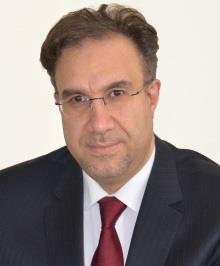
An Iraqi citizen, turning his head to protect his identity, proudly displays the indelible ink on his finger as proof he has voted in Iraq’s first free election in over 50 years on Jan. 30, 2005. Everyone voting in the historic election has to mark their finger with the ink to indicate they have already voted as a means to deter voting fraud. DoD photo by Master Sgt. Dave Ahlschwede, U.S. Air Force. (Released)
Iraqis went to the polls last Saturday in the first parliamentary election since ISIS forces were driven out of Iraq last year. So far, results show the coalition led by Shia cleric Muqtada al-Sadr’s coalition is ahead, with current PM Haider al-Abadi failing to hang on to power. However, it is always tricky to simply discuss winners and losers after the elections. The system is designed to prevent a ‘winner takes it all’ outcome. Post-election negotiations are equally – if not more – important in determining how the next government will be formed and on which conditions.
This system has its flaws that must be tackled in the future, but this is not a priority today. Legally, the ‘winner’ is the bloc which acquires the largest number of seats in Parliament and which registers as part of as a formal coalition during the first session of the new Parliament.
This vague interpretation was given by the federal court for the article 76-A of the constitution that granted the largest coalition the right to form a government. The interpretation came after a controversy caused by the failure of any coalition in securing a majority votes in 2010 election, resulting in a conflict between the coalition that won larger number of seats, Al-Iraqiyya, and the State of Law coalition, led by then-Prime Minister, Nuri al-Maliki, that came second.
In practice, the interpretation means that even if the Sadr-backed Sairun won more seats than others, they might not come out as the ‘winners’ if another coalition is formally announced before the first session of Parliament, similarly to the National Iraqi Alliance in 2010.
In the upcoming days and weeks, negotiations will be focused on creating this largest parliamentary bloc, which explains news and rumours about meetings between the Fatah Alliance, Nuri al-Maliki’s State of Law Coalition (SOL) and Haider al-Abadi’s Naser Coalition. However, these should be seen as only exploratory conventions.
In his coded tweet, Sadr indicated his preference in forming a bloc that excludes Fatah and the SOL. Therefore, these might soon regroup to counter Sadr and form a larger bloc. But numbers will not help, unless if they manage to include a third major coalition, likely the Naser Coalition.
The negotiation among Shia-dominated groups will be largely centered on winning Abadi over, although surprises are still possible in this very fragmented map, where some coalitions could be divided further and assuming Sadr–Fatah rapprochement is not an option.
That said, Abadi still has the advantage of being the balancer and the preponderant. He might be the king who can become kingmaker and king again. He is wounded by the results but hasn’t lost yet.
The two most likely scenarios to form the largest bloc are either an alliance between Sadr, Abadi and Hakim, based on a centrist, reformist, non-sectarian programme, or the revival of a grand Shia bloc, based on communal solidarity and on the desire to contain Sadr from dictating the process.
Judging on his latest statements, Abadi might be more inclined towards an alliance with Sadr, which could secure him a second term with acceptable conditions – a government of technocrats and independents backed by parliamentary majority. The price to be paid, however, is high: leaving the Dawa party.
The fact that most Dawa old guards failed in the elections could encourage him to move in that direction. Fatah and the SOL might pre-empt and offer Abadi a second term, which is only possible if Maliki concluded that Sadr is more a threat to him than Abadi. But even then, Abadi may not accept, knowing that this coalition, which excludes the Sadrists and reproduces the old unpopular formula, will hurt him in the long run.
These are just a few possible scenarios. Time could prove me wrong, simply because alliance-formation in Iraq is not fully – or even principally – based on programmes or ideologies. Factors such as personalities, patronage, foreign intervention and sheer pragmatism always interject.
Harith Hasan al-Qarawee is Nonresident Senior Fellow at the Atlantic Council and Senior Research Fellow at the Central European University.
Source: The London School of Economics and Political Sciences, Middle East Blog,
http://blogs.lse.ac.uk/mec/2018/05/16/what-lies-ahead-for-iraq-after-the-elections/








Comment here